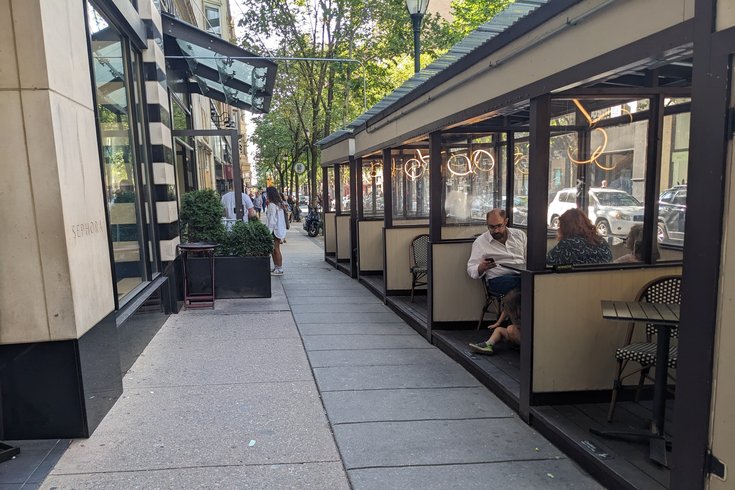
August 23, 2024
 Michaela Althouse/PhillyVoice
Michaela Althouse/PhillyVoice
Gran Caffe L'Aquila is one of only 26 restaurants in Philadelphia that has a streetery. The City Controller's Office says the permitting process needs to be less expensive and complicated.
The process for restaurants in Philadelphia to add 'streeteries' is unnecessarily costly, time-consuming and complex, prompting many to forgo the outdoor dining structures that became popular during the COVID-19 pandemic, according to a report the City Controller's Office released earlier this week.
The report, released Wednesday, took a closer look at the city's permitting process to obtain a license for a streetery. Though critics argue streeteries limit sidewalk space and reduce parking revenue, City Controller Christy Brady said the tax revenue they'd generate would surpass lost parking revenue.
"I do think it's good for the city, I do think it's good economically for local businesses, not only just for the restaurant, but for the businesses around the restaurants," Brady said. "We want to attract people to come into the city, and I think it creates a vibrant environment that attracts people to want to come in."
The report looked at permit applications from 2013-2014. Pre-pandemic, about 250 restaurants had sidewalk cafe licenses, Brady said. At the height of the pandemic, when the city reduced restrictions on outdoor dining, there were more than 800 streeteries. But the city implemented a new permitting process in January 2023, and now there only are 26 permitted streeteries.
Brady's report criticized the city's permitting process as being too costly to restaurants, noting the annual licensing fee of $1,750 is significantly higher than Pittsburgh's annual rate of $150. Brady also found the approval process to be too lengthy, and that strict regulations on size, location and other compliance measures create too much red tape.
This all results in restaurants having trouble acquiring the spaces and — once in place — keeping them profitable, the report found.
"The mayor said when she came in that she wants the city open for business and to make it easier to apply for a permit, and I agree," Brady said. "If there's a way that you can apply for a permit and the process happened with that application, and not have the restaurant owner have to go to this department for this approval and this department for this approval — to streamline that process will make it much better for the business owner, especially because some of these are local and small business owners."
To make streeteries more attractive to restaurants, Brady's report recommended streamlining the application process by reducing the approvals needed from different departments. She said the application and renewal fees should be lowered; she suggested creating a multi-year permit option like New York City has.
The report also recommended reducing insurance requirements, clarifying size and location requirements, and developing better relationships between restaurant owners and the city. It called for gathering neighborhood input by engaging with community groups.
Some progress has been made. A new law allows streeteries to extend beyond a restaurant's property with a letter of approval from neighboring businesses. It also created "navigators" to guide restaurant owners through the permitting and approval process. The law was proposed in April by Councilmember Rue Landau and signed by Mayor Cherelle Parker in June.
"The Controller's report echoes what we are hearing from businesses, that they are frustrated with the current process for getting approval to do outdoor dining, and rightfully so," Landau said in an email. "My recent bill allows restaurants to extend their streeteries beyond their boundaries to the neighboring property, with the neighbor owner’s approval. It's just our first step in solving a larger issue — we want to make it easier to expand outdoor dining options in our city. We need a streamlined application and clear communication about the process."